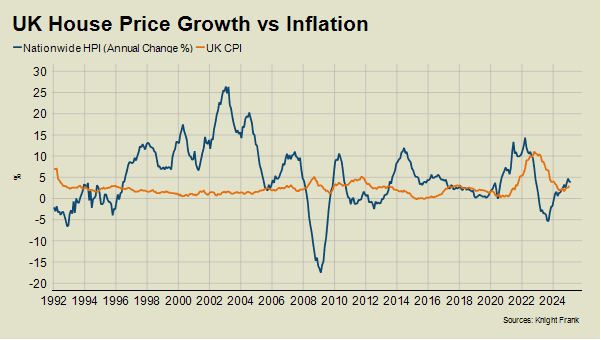How is the value of your property faring v inflation?

Knight Frank has released its latest analysis on the UK residential property market, reflecting on the impact that UK inflation, which exceeded the annual rate of house price growth between September 2022 and June 2024, has had on the sector, writes Zah Azeem, Partner at Wimbledon based surveyors Scrivener Tibbatts, a valuation specialist.
UK inflation rose unexpectedly to 3% this month, while house prices are edging in the opposite direction.
The change in the Consumer Price Index (CPI) peaked at 11.1% in October 2022, while the Nationwide and Halifax indices were largely flat or falling during the 20-month period, bottoming out at -5.3% and -4.3%, respectively, in Q3 2023.
Buyers and sellers are unlikely to experience similar choppy waters in 2025, but they are certainly swimming against a gentle and unpredictable current, according to Tom Bill, Knight Frank’s Head of Residential Research: “When you consider that demand is being temporarily supported by April’s stamp duty increase, it wouldn’t be a surprise to see the two lines on the chart below cross over again.
“Not that inflation exceeding house price growth is necessarily a bad sign. However, in addition to the post-Covid period, it happened during the global financial crisis, a period that was marked by austerity and the eurozone crisis in the first half of the last decade and during the UK recession of the early 1990s.
“Dramatic movements are unlikely this time, with the housing market showing signs of strength after the rise in mortgage rates that followed October’s Budget.
“Furthermore, transactions and mortgage approvals in December were only marginally below the five-year average.”
Bill points to the fact that the early-January jitters ahead of Donald Trump’s inauguration due to the inflationary risks of tariffs have also subsided, “though not disappeared”. Indeed, global financial markets generally spent February in risk-averse mode, as the price of safe-haven assets like gold rose strongly.
Tom Bill concludes: “Overall, residential property supply has been stronger than demand so far in 2025 due to a similar risk-averse attitude among some buyers. However, the current sweet spot is equity-rich, needs-driven buyers.
“The question now is whether the spring market will blossom in the normal way. On the one hand, inflationary pressures that include higher employer national insurance contributions and minimum wage costs are on the horizon.
“On the other, the Bank of England appears increasingly comfortable with going beyond its primary remit of containing inflation to support economic growth.
“The uncertain outlook means the spring statement on 26 March will be a key opportunity for the Chancellor to set the tone for 2025. Creating more financial headroom will alleviate the upwards pressure on borrowing costs, which will be good for housing demand. Provided it’s not done by raising taxes that simultaneously dampen buyer appetite.”
If you would like to discuss something related to a valuation please contact Zah via email at zah@scrivenertibbatts.co.uk or call 020 8947 7040.
